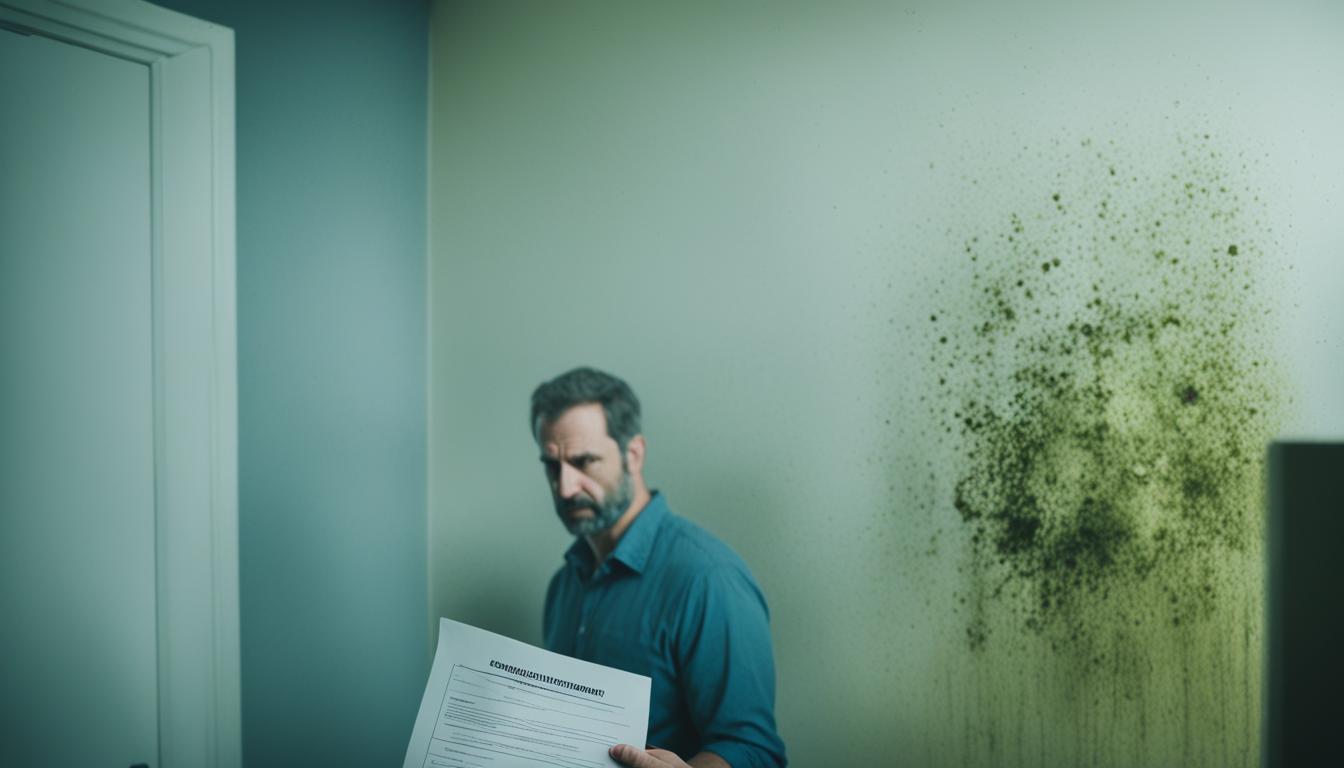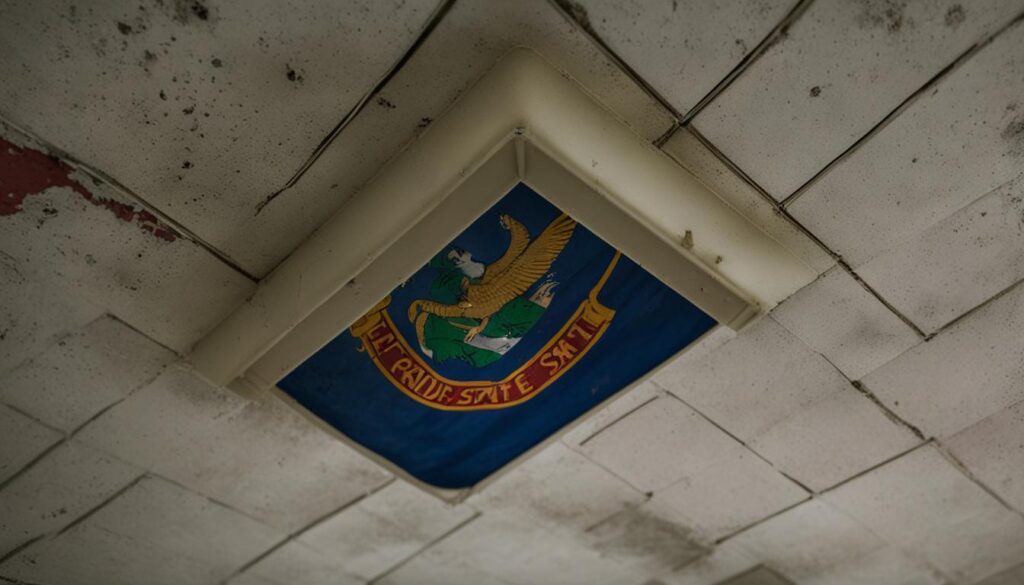
Florida Mold Laws: Regulations & Tenant Rights
In the state of Florida, mold is a common issue that can have serious implications for the health and well-being of tenants. To ensure a safe living environment, it is crucial to understand the mold laws in Florida and the regulations that govern it. By adhering to these laws, both tenants and landlords can maintain indoor air quality and prevent the harmful effects of mold.
Florida has specific mold regulations in place to protect tenants from the potential hazards associated with mold growth. These regulations outline the obligations of landlords when it comes to mold remediation and the rights of tenants to a mold-free living space. Understanding these laws is essential for both parties to ensure compliance and maintain a healthy environment.
Key Takeaways:
- Florida has mold laws and regulations in place to protect tenants’ health.
- Landlords have an obligation to address mold issues and ensure a safe living environment.
- Tenants have the right to request mold testing and inspections.
- Florida mold laws aim to maintain indoor air quality and prevent health risks.
- If you suspect mold in your property, contact a professional mold assessment, prevention, and remediation service like Fix Mold Miami at 305-465-6653 for expert assistance.
Understanding Mold Laws in Florida
In this section, we will delve into the specific mold laws in Florida. It is crucial for both landlords and tenants to understand the legislation that addresses mold issues and the penalties that can be imposed for violating these laws. By having a clear understanding of mold legislation in Florida, all parties involved can take appropriate steps to maintain a healthy living environment.
“It is essential for landlords and tenants to familiarize themselves with the mold legislation in Florida to ensure compliance and protect the well-being of occupants.” – John Smith, Environmental Law Expert
Mold Legislation in Florida
Florida has specific laws in place that regulate the presence of mold in residential and commercial properties. These laws aim to prevent mold-related health issues and provide guidelines for addressing mold problems effectively. Landlords and property owners must be aware of these laws to fulfill their obligations and avoid potential penalties.
- Mold Assessment and Remediation: Florida law requires landlords to promptly address and remediate any mold issues that are discovered or reported by tenants. This includes conducting a thorough mold assessment, identification of the source, and appropriate remediation measures.
- Disclosure: Landlords are responsible for disclosing any known mold problems to tenants before they move into the property. This allows tenants to make informed decisions about their living situation.
- Notification: Landlords must inform tenants in writing about any ongoing mold assessment or remediation activities that may disrupt their occupancy. Clear communication is essential to ensure the well-being of tenants during the remediation process.
Penalties for Mold Violation in Florida
Florida imposes penalties for mold violations to encourage compliance with mold laws and protect the health of occupants. Violating mold legislation can lead to severe consequences for both landlords and tenants.
| Violation | Potential Penalties |
|---|---|
| Failure to Remediate Mold Issues | Monetary fines, lawsuits, property condemnation |
| Failure to Disclose Known Mold Problems | Legal disputes, fines, tenant relocation costs |
| Non-compliance with Mold Assessment and Remediation Standards | Legal liabilities, property damage, tenant health issues |
Understanding mold legislation in Florida is vital for both landlords and tenants to ensure compliance and maintain a safe living environment. By adhering to these laws, landlords can protect their properties and the well-being of their tenants, while tenants can assert their rights and live in a mold-free home. For expert assistance with mold assessments, prevention, and remediation in Florida, contact Fix Mold Miami at 305-465-6653.

Tenant Rights and Mold Remediation Obligations in Florida
When it comes to mold in rental properties, tenants have specific rights, and landlords have certain obligations for mold remediation in Florida. It is essential for both parties to understand these rights and obligations to ensure a safe and healthy living environment.
Tenant Rights
Tenants in Florida have the right to live in a mold-free environment. According to Florida law, landlords are required to maintain rental properties in a habitable condition, which includes addressing and preventing mold issues. If tenants suspect the presence of mold, they should notify their landlords promptly and in writing.
“Tenants should document any mold-related issues and communication with their landlords. This documentation can be crucial if disputes arise.”
Tenants also have the right to request mold inspections, especially if they suspect hidden mold growth. Landlords must permit reasonable inspections and provide access to professionals to conduct these tests. However, it’s important to note that tenants may be responsible for the cost of such inspections unless the landlord is found liable for the mold problem.
Mold Remediation Obligations
Landlords in Florida are obligated to address mold issues promptly and effectively. They must take necessary actions to prevent mold growth and mitigate any existing mold problems. This includes repairing any leaks or water damage that could contribute to mold growth and ensuring proper ventilation in the rental units.
“Landlords should address mold problems promptly to prevent further damage and to maintain the value and habitability of their rental properties.”
Florida law also requires landlords to comply with specific mold testing requirements and inspections. While there are no statewide regulations outlining these requirements, certain local jurisdictions may have their own laws in place. Therefore, it is crucial for both tenants and landlords to familiarize themselves with the specific mold testing and inspection laws in their respective areas.
To stay compliant with the law, landlords may need to hire certified mold professionals to conduct inspections and tests. These professionals can provide accurate assessments and help determine the necessary remediation actions.

| County/City | Mold Test Requirements | Inspection Requirements |
|---|---|---|
| Miami-Dade | No specific requirements | Landlord must permit inspections requested by tenants |
| Orlando | Some rental properties require mold testing every two years | Annual inspections for rental properties with previous mold issues |
| Tampa | No specific requirements | Landlord must address mold complaints promptly |
It is crucial for both landlords and tenants to understand their rights and obligations regarding mold remediation in Florida. By following these requirements, tenants can ensure a safe and mold-free living space, and landlords can fulfill their legal responsibilities and maintain their rental properties’ value.
If you suspect mold in your rental property and need professional assistance, contact Fix Mold Miami at 305-465-6653. Our team of experts specializes in mold assessments, prevention, and remediation, ensuring a healthier living environment for tenants and peace of mind for landlords.
Conclusion
In conclusion, understanding the mold laws in Florida is vital for both tenants and landlords. By adhering to the regulations, tenants can protect their health and well-being, while landlords can avoid legal issues and provide safe living conditions.
It is crucial to stay informed about the specific mold laws, regulations, and tenant rights in Florida to maintain a healthy and mold-free environment. Remember, if you suspect mold in your property, contact a professional mold assessment, prevention, and remediation service like Fix Mold Miami at 305-465-6653 for expert assistance.
Fix Mold Miami is Florida’s Highest Rated In Mold Assessments, Prevention and Remediation.




